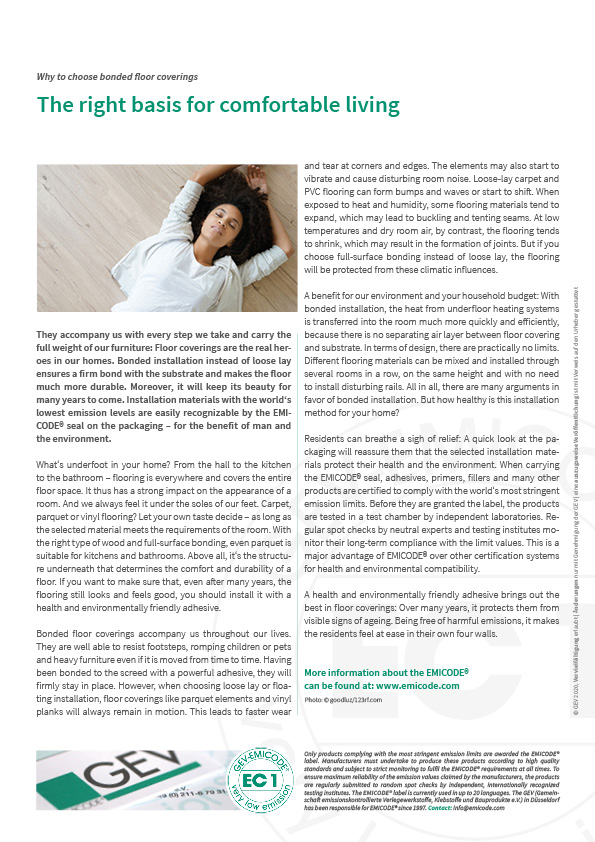The right basis for comfortable living
Why to choose bonded floor coverings
What’s underfoot in your home? From the hall to the kitchen to the bathroom – flooring is everywhere and covers the entire floor space. It thus has a strong impact on the appearance of a room. And we always feel it under the soles of our feet. Carpet, parquet or vinyl flooring? Let your own taste decide – as long as the selected material meets the requirements of the room. With the right type of wood and full-surface bonding, even parquet is suitable for kitchens and bathrooms. Above all, it’s the structure underneath that determines the comfort and durability of a floor. If you want to make sure that, even after many years, the flooring still looks and feels good, you should install it with a health and environmentally friendly adhesive.
Bonded floor coverings accompany us throughout our lives. They are well able to resist footsteps, romping children or pets and heavy furniture even if it is moved from time to time. Having been bonded to the screed with a powerful adhesive, they will firmly stay in place. However, when choosing loose lay or floating installation, floor coverings like parquet elements and vinyl planks will always remain in motion. This leads to faster wear and tear at corners and edges. The elements may also start to vibrate and cause disturbing room noise. Loose-lay carpet and PVC flooring can form bumps and waves or start to shift. When exposed to heat and humidity, some flooring materials tend to expand, which may lead to buckling and tenting seams. At low temperatures and dry room air, by contrast, the flooring tends to shrink, which may result in the formation of joints. But if you choose full-surface bonding instead of loose lay, the flooring will be protected from these climatic influences.
A benefit for our environment and your household budget: With bonded installation, the heat from underfloor heating systems is transferred into the room much more quickly and efficiently, because there is no separating air layer between floor covering and substrate. In terms of design, there are practically no limits. Different flooring materials can be mixed and installed through several rooms in a row, on the same height and with no need to install disturbing rails. All in all, there are many arguments in favor of bonded installation. But how healthy is this installation method for your home?
Residents can breathe a sigh of relief: A quick look at the packaging will reassure them that the selected installation materials protect their health and the environment. When carrying the EMICODE® seal, adhesives, primers, fillers and many other products are certified to comply with the world’s most stringent emission limits. Before they are granted the label, the products are tested in a test chamber by independent laboratories. Regular spot checks by neutral experts and testing institutes monitor their long-term compliance with the limit values. This is a major advantage of EMICODE® over other certification systems for health and environmental compatibility.
A health and environmentally friendly adhesive brings out the best in floor coverings: Over many years, it protects them from visible signs of ageing. Being free of harmful emissions, it makes the residents feel at ease in their own four walls.

Photo: ©goodluz/123rf.com
They accompany us with every step we take and carry the full weight of our furniture: Floor coverings are the real heroes in our homes. Bonded installation instead of loose lay ensures a firm bond with the substrate and makes the floor much more durable. Moreover, it will keep its beauty for many years to come. Installation materials with the world’s lowest emission levels are easily recognizable by the EMICODE® seal on the packaging – for the benefit of man and the environment.

Do You Have Questions?
If you have questions about specific topics or if you would like to contact us for any other reason, feel free to contact us by phone, fax or e‑mail.
Phone: +49 211 / 67931–20
Fax: +49 211 / 67931–33
info@emicode.com
Share article on Social Media:
